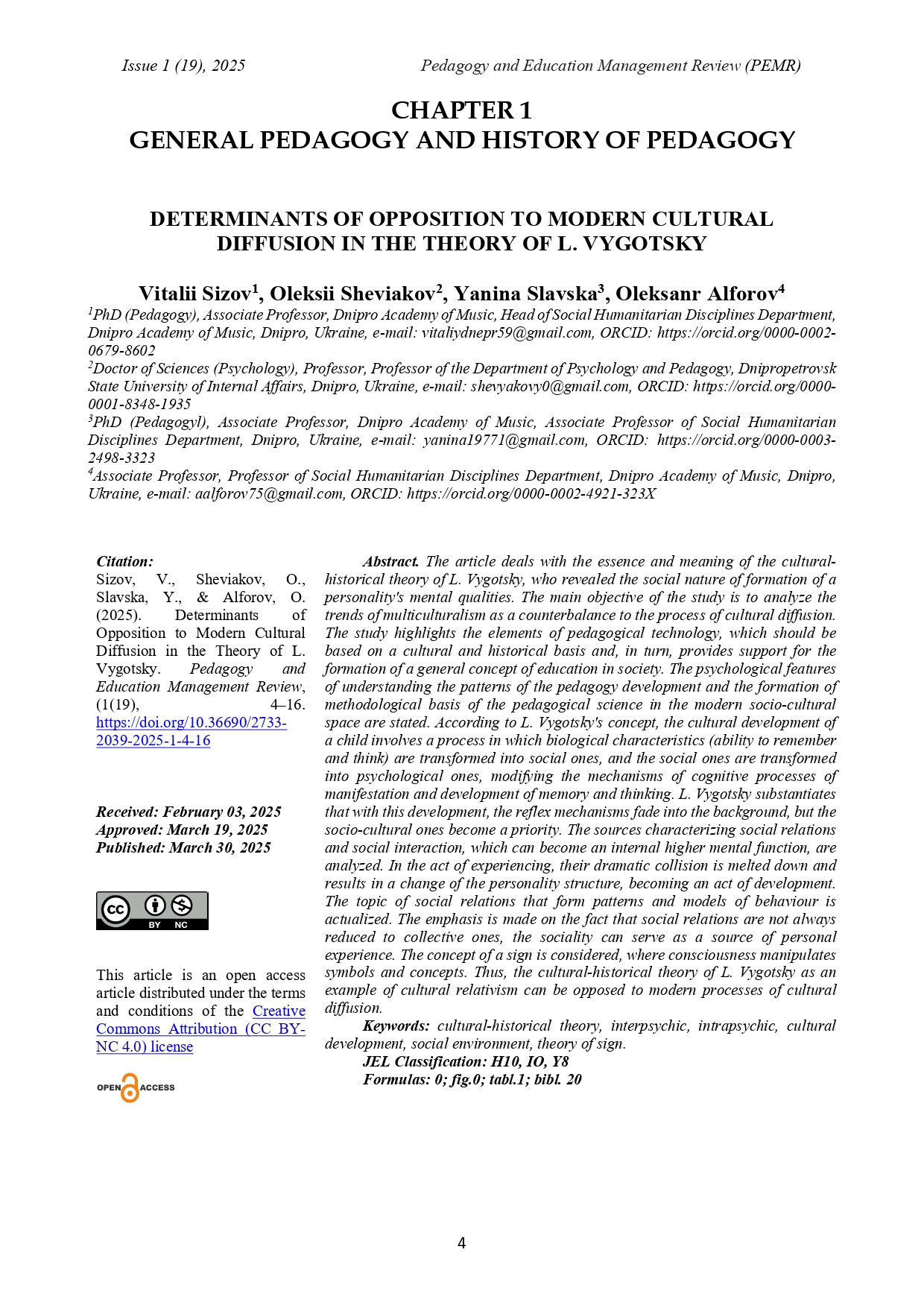DETERMINANTS OF OPPOSITION TO MODERN CULTURAL DIFFUSION IN THE THEORY OF L. VYGOTSKY
DOI:
https://doi.org/10.36690/2733-2039-2025-1-4-16Keywords:
cultural-historical theory, interpsychic, intrapsychic, cultural development, social environment, theory of signAbstract
The article deals with the essence and meaning of the cultural-historical theory of L. Vygotsky, who revealed the social nature of formation of a personality's mental qualities. The main objective of the study is to analyze the trends of multiculturalism as a counterbalance to the process of cultural diffusion. The study highlights the elements of pedagogical technology, which should be based on a cultural and historical basis and, in turn, provides support for the formation of a general concept of education in society. The psychological features of understanding the patterns of the pedagogy development and the formation of methodological basis of the pedagogical science in the modern socio-cultural space are stated. According to L. Vygotsky's concept, the cultural development of a child involves a process in which biological characteristics (ability to remember and think) are transformed into social ones, and the social ones are transformed into psychological ones, modifying the mechanisms of cognitive processes of manifestation and development of memory and thinking. L. Vygotsky substantiates that with this development, the reflex mechanisms fade into the background, but the socio-cultural ones become a priority. The sources characterizing social relations and social interaction, which can become an internal higher mental function, are analyzed. In the act of experiencing, their dramatic collision is melted down and results in a change of the personality structure, becoming an act of development. The topic of social relations that form patterns and models of behaviour is actualized. The emphasis is made on the fact that social relations are not always reduced to collective ones, the sociality can serve as a source of personal experience. The concept of a sign is considered, where consciousness manipulates symbols and concepts. Thus, the cultural-historical theory of L. Vygotsky as an example of cultural relativism can be opposed to modern processes of cultural diffusion.
Downloads
References
Dafermos, M. (2016). Critical Reflection on the Reception of Vygotsky’s Theory in the International Academic Communities. Cultural-Historical Psychology. Vol.12, No3. P. 25-38. https://psyjournals.ru/files/83547/kip_3_2016_dafermos.pdf
Vygotsky, L. S. (1928). The Problem of the Cultural Development of the Child. Bulletin of Moscow University. 14.1991. No4. P. 5-18. http://flogiston.ru/library/vyg_cult
Vygotsky, L. S. (1960). The Development of Higher Mental Functions: from Unpublished Works. Moscow: Publishing House of the Academy of Pedagogical Sciences of the RSFSR, 1960. 500 p.
Vygotsky, L. S. (1934) Thinking and Speech. https://www.marxists.org/russkij/vygotsky/1934/thinking-speech.pdf.
Veresov N. Cultural-Historical Psychology of L. S. Vygotsky: Hard work of Understanding. Reader's Notes. 2007. http://nveresov.narod.ru/NLO.pdf
Keiler, P. (2012). “Cultural-Historical Theory” and “Cultural-Historical School”: From Myth (Back) to Reality) Psychological Journal. Dubna No 1, p. 1-33. URL: https://marxismocritico.files.wordpress.com/2013/02/2012n1a1-1.pdf
Zashikhina, I.M. (2014). Why is the Cultural-Historical Theory of Lev Vygotsky relevant today? P. 42-54. http://gum.narfu.ru/upload/iblock/58f/38_46.pdf
Bessarabova, I.S. (2011). Jerome Bruner's Views on the Culture and Education Relation Problem. Educational Psychology in XXI Century: Theory and Practice. https://psyjournals.ru/education21/issue/54836_full.shtml
Volkova, E.N., Volkova I.V., Skitnevskaya L.V. (2017). Vygotsky's Cultural-Historical Theory as a Methodological Basis for Teenage Bullying Studies. https://cyberleninka.ru/article/n/kulturno-istoricheskaya-teoriya-l-s-vygotskogo-kak-metodologicheskoe-osnovanie-dlya-issledovaniy-podrostkovogo-bullinga/viewer
Sizov, V.V. (2018). Culturological Aspects of A. Makarenko's Pedagogy. Spirituality of a Personality: Methodology, Theory and Practice: Collection of research materials. ISS. 1 (82). Sievierodonetsk: V. Dahl EUNU, 2018. P. 217-224.
Sizov, V.V., Slavska Ya. Bondarenko O. (2021). Determinism of E. Durkheim in the Theory of Pedagogy and Education. Spirituality of a Personality: Methodology, Theory and Practice: Collection of research materials. ISS. 1 (100) – 2021 Sievierodonetsk: V. Dahl EUNU, 2021. P. 202-218. DOI: https://doi.org/10.33216/2220-6310-2021-100-1-202-218
Zinchenko, P. (1959). Questions on the Psychology of Memory, in the coll.: Psychological Science in the USSR in 2 vols. Vol. 1, M.: Publ.H. of the RFFSR APS. 599 p.
Galperin, P. Ya. (1965). The Main Results of the Research on the Problem of “Formation of Mental Actions and Concepts": Report for a Doctor of Pedagogic Sciences Degree (psychology) on the totality of works. M.: 51 p.
Elkonin, D. (1960). The Child Psychology. M. 384 p.
Elkonin, D. B. (1966). The Problem of Instruction and Development in the Works of L. S. Vygotsky. Questions of Psychology. No 6. P.34-48.
Elkonin, D. B., Zaporozhets A.V., Galperin P. Ya. (1963). Problems of Knowledge and Skill Formation in Schoolchildren and New Teaching Methods at School. Questions of Psychology. No 5. P. 23-39.
Bozhovich, L.I. (1988). On Vygotsky's Cultural-Historical Theory and Its Significance For Contemporary Studies on the Psychology of Personality. Questions of Psychology. No 5. P.108-117.
Bruner, J. (2006). The Culture of Education. Moscow Higher School of Social and Economic Sciences. M.: Education. 223 p.
Makarenko, A.S. (1987). Collected works in four volumes. Vol. 4. M. p. 465.
Sheviakov, O.V., Lykov A.V. School of Psychological Development of Students as a Way of Personality Development. Bulletin of Dnipropetrovsk State University. Psychology and Pedagogy. ISS. 3. 1998. P.103-106.







